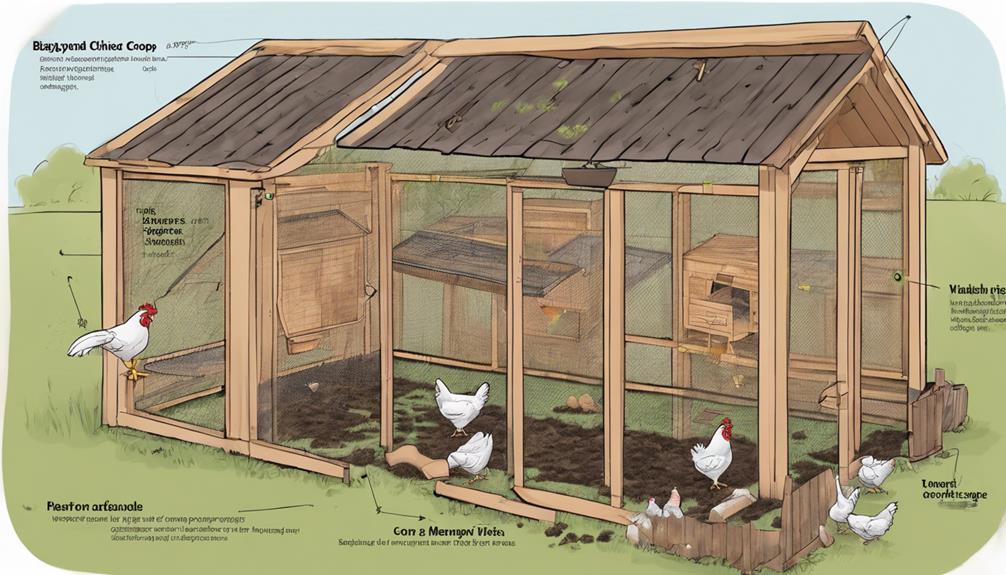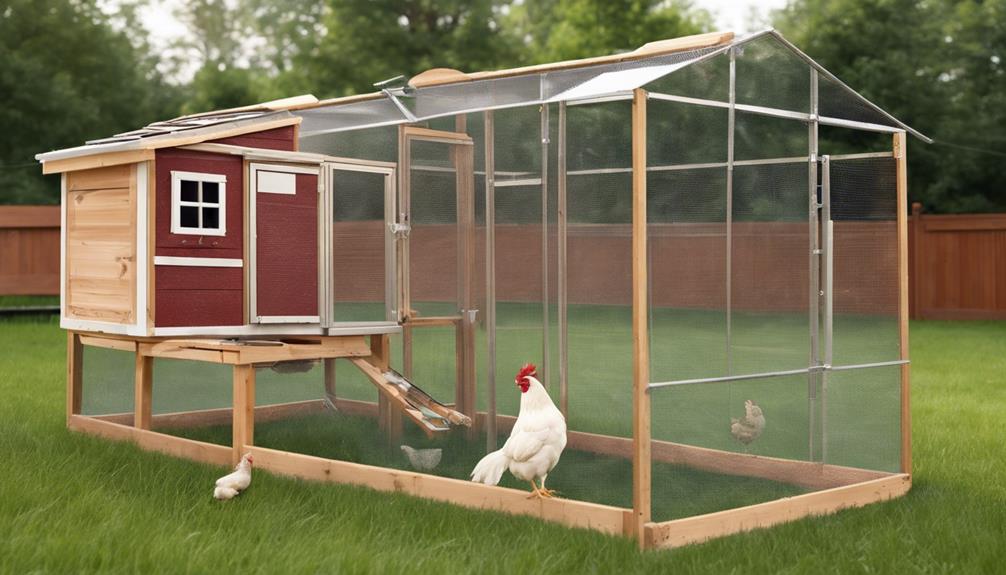10 Essential Tips for Backyard Chicken Farming Zoning Laws"
To excel in backyard chicken farming, grasp the zoning laws. Understand local regulations to know your limits on the number and type of birds allowed. Check the setback rules for coop placement and address noise concerns to keep peace with neighbors. Review restrictions on roosters and comply with set limits. Evaluate waste management guidelines and stay within property boundaries. Prioritize health standards like ventilation and fencing. When considering legal advice on zoning laws, ensure compliance for a successful chicken farm. Mastering these tips will lead you to a flourishing backyard chicken operation.
Understanding Local Zoning Regulations
When starting your backyard chicken farming journey, it's crucial to understand the local zoning regulations in your area to ensure compliance and smooth operations. Farming restrictions and land use policies vary widely between different regions, so it's essential to familiarize yourself with the specific rules that apply to your location.
Local zoning regulations often dictate the type and number of animals allowed on residential properties. Some areas may have restrictions on the total land area required per animal or may limit the number of roosters due to noise concerns. Understanding these limitations will help you plan your backyard chicken farm more effectively and avoid potential conflicts with local authorities.
Additionally, zoning laws may also address issues such as coop placement, waste management, and proximity to neighboring properties. It's crucial to review these regulations to ensure that your farm layout complies with all requirements. For example, some areas may have specific setbacks for coops from property lines to minimize disturbances to neighbors.
Researching Property Zoning Designations
To effectively navigate backyard chicken farming zoning laws, start by researching the property zoning designations specific to your location. Understanding the zoning designations and regulations set by your local government is crucial in determining whether you can keep chickens on your property.
Here are some key points to consider:
- Property Boundaries: Identify the exact boundaries of your property to ensure that your chicken coop and run will be within your land limits. Violating property boundaries could lead to legal issues and fines.
- Restrictions: Look into any restrictions that may apply to raising chickens on your property. Some areas have specific rules regarding the number of chickens allowed, coop placement, and noise levels.
- Zoning Designations: Determine the zoning designation of your property, such as residential, agricultural, or mixed-use. Different zones may have varying regulations when it comes to keeping livestock.
- Regulations: Familiarize yourself with the specific zoning regulations related to keeping chickens. This includes rules on coop sizes, setback requirements, waste management, and more.
Researching these property zoning designations and regulations will provide you with the necessary information to proceed with setting up your backyard chicken farm within the legal parameters of your area.
Checking Setback Requirements for Coops
Ensure that you carefully review the setback requirements for your chicken coop to comply with local zoning regulations. Coop placement and setback requirements are crucial considerations when setting up your backyard chicken farm. Before finalizing the location of your coop, conduct a thorough land use restrictions analysis to ensure compliance with the setback regulations in your area.
Check with your local zoning department or municipality to obtain the specific setback requirements for chicken coops. Setback regulations typically dictate the minimum distance that a coop must be situated from property lines, neighboring dwellings, and other structures. These regulations are in place to ensure that the placement of the coop doesn't infringe upon neighboring properties or pose any safety risks.
When evaluating potential locations for your chicken coop, take into account the required setbacks to avoid any violations. Consider factors such as accessibility, sunlight exposure, and proximity to your residence. By adhering to setback requirements, you can prevent future conflicts with neighbors and authorities, ensuring a smooth and compliant backyard chicken farming operation.
Remember that setbacks may vary depending on your location, so it's essential to verify the specific regulations that apply to your property. Taking the time to understand and comply with these requirements will help you establish a well-planned and legally compliant chicken farming setup.
Compliance With Noise Ordinances
Consider the local noise ordinances when planning your backyard chicken farming operation to ensure compliance with regulations. It's crucial to be mindful of the noise levels generated by your chickens to maintain positive relationships with your neighbors and abide by the law.
Here are some essential tips for complying with noise ordinances:
- Noise Mitigation Strategies: Implement measures such as limiting the number of roosters on your property, as they're typically the primary source of noise. Providing your chickens with enough space, food, and water can also help reduce excessive vocalization.
- Community Engagement: Keep an open line of communication with your neighbors regarding your chicken farming activities. Informing them about your farming practices and being receptive to their feedback can foster better neighborly relations and address any noise-related concerns proactively.
- Neighbor Relations: Building good relationships with your neighbors is key to addressing any noise complaints constructively. Being considerate of their schedules and privacy can go a long way in preventing conflicts related to noise disturbances.
- Soundproofing Solutions: Explore soundproofing options for your chicken coop to minimize noise transmission. Adding insulation, sealing gaps, and installing sound-absorbing materials can help reduce the noise levels that reach neighboring properties.
Reviewing Limitations on Number of Chickens
When evaluating your backyard chicken farming plans, it's important to review any restrictions on the maximum number of chickens allowed on your property. Different areas have varying regulations regarding the number of chickens you can keep, so it's crucial to be aware of these limitations before starting your flock.
Some zoning laws specify the maximum number of chickens based on the size of your property. For example, a smaller lot may only be allowed to have a limited number of chickens to prevent overcrowding and noise disturbances. It's essential to check your local ordinances to ensure compliance and avoid any fines or penalties.
When selecting chicken breeds, consider the space requirements and the number of eggs or meat you expect to harvest. Certain breeds are more suited for smaller spaces, while others may need more room to roam freely. Additionally, some breeds are quieter than others, which can help you stay within noise regulations in urban or suburban areas.
Rooster restrictions are another important factor to consider. Roosters are typically louder than hens and are often prohibited in residential areas due to their crowing. Make sure to check if roosters are allowed in your area before acquiring any, as violating this regulation can lead to legal issues.
Knowing Permitting Procedures
To navigate the requirements for backyard chicken farming, familiarize yourself with the specific permitting procedures in your local area. The permitting process is crucial to legally establish your chicken farm. Here are some key points to consider:
- Research the Permitting Process: Begin by researching the permitting process for keeping chickens in your locality. Visit your local government's website or contact the zoning department to understand the specific requirements.
- Understand Application Requirements: Make sure you're aware of all the application requirements for obtaining a permit. This may include submission of a site plan, details of the coop, and other necessary information.
- Explore Zoning Variances: In some cases, you may need to apply for zoning variances if your property doesn't meet the standard requirements for keeping chickens. Be prepared to navigate this process if needed.
- Consider Legal Considerations: Familiarize yourself with any legal considerations related to backyard chicken farming in your area. This could include restrictions on the number of chickens, coop placement, or noise regulations.
Considering Waste Management Rules

How do waste management rules impact the operation of your backyard chicken farm?
Proper waste disposal is crucial for the sustainability of your farm and to minimize the environmental impact. When it comes to managing waste from your chicken farm, you need to consider various factors to ensure compliance with regulations and maintain a clean environment.
Start by setting up designated areas for waste disposal. This can include composting bins for organic waste like chicken manure, which can later be used as fertilizer for your garden. Regularly cleaning the coop and disposing of waste appropriately will help prevent foul odors and the accumulation of harmful bacteria.
To further reduce the environmental impact, consider implementing recycling practices for non-organic waste such as packaging materials or feed containers. This can help minimize the amount of waste that ends up in landfills.
Additionally, familiarize yourself with local waste management regulations to ensure you're following the correct procedures. Some areas may have specific rules regarding waste disposal from backyard farms to prevent pollution and protect public health.
Learning About Property Boundary Restrictions
Proper understanding of property boundary restrictions is key to ensuring compliance and avoiding potential conflicts in your backyard chicken farming operation. When it comes to keeping chickens on your property, being aware of boundary specifications and addressing neighboring concerns are essential. Here are some crucial points to consider:
- Review Local Zoning Regulations: Check your local zoning laws to understand the specific rules regarding property boundaries for keeping backyard chickens. Some areas may have minimum distance requirements from property lines to coop structures.
- Communicate with Neighbors: It's beneficial to discuss your chicken farming plans with your neighbors. Addressing any potential concerns they might've can help prevent conflicts in the future.
- Install Physical Barriers: Consider installing physical barriers like fences or hedges to clearly mark your property boundaries. This can prevent your chickens from wandering onto neighboring properties.
- Respect Property Lines: Ensure that your chickens don't encroach on neighboring properties. It's important to respect property lines to maintain a positive relationship with your neighbors and stay within legal boundaries.
Evaluating Health and Safety Standards

When assessing your backyard chicken farming setup, prioritize evaluating health and safety standards to ensure the well-being of your flock and compliance with regulations.
Adhering to health regulations is crucial for maintaining a safe environment for your chickens and your household. Ensure that your coop is well-ventilated to prevent respiratory issues and that it's regularly cleaned to minimize the risk of disease spread. Implementing a proper waste management system and providing access to clean water and balanced nutrition are essential components of meeting health standards.
Safety measures are equally important in safeguarding both your chickens and your property. Install secure fencing around the coop to protect your flock from predators and prevent them from wandering into restricted areas. Check for any potential hazards such as sharp objects, toxic plants, or low-hanging branches that could pose a danger to your chickens. Additionally, have a first aid kit readily available in case of emergencies and familiarize yourself with basic poultry health care practices.
Regularly inspecting your setup for compliance with health regulations and safety measures won't only ensure the well-being of your chickens but also help you avoid any legal issues. By proactively assessing and addressing these standards, you can create a safe and healthy environment for your backyard chicken farming venture.
Consulting With Legal Professionals
To ensure full compliance with zoning laws and regulations concerning backyard chicken farming, seeking guidance from legal professionals is recommended. Legal advice can provide you with the necessary information to navigate the complexities of zoning laws specific to your area. Zoning consultation services can offer insights into how these laws apply to your backyard chicken farming operation.
Here are some key points to consider when consulting with legal professionals:
- Understand Local Zoning Laws: Legal professionals can help you understand the specific zoning laws that apply to your property regarding backyard chicken farming.
- Compliance Assistance: They can assist you in ensuring that your setup complies with all relevant regulations, avoiding potential fines or legal issues.
- Permitting Guidance: Legal experts can guide you through the permitting process, helping you obtain any necessary permits for your backyard chicken farm.
- Conflict Resolution: In case of any conflicts or issues with local authorities, legal professionals can provide representation and support to resolve the matter effectively.
Consulting with legal professionals not only helps you stay compliant with the law but also provides you with peace of mind knowing that you're operating within the legal boundaries of backyard chicken farming in your area.
Frequently Asked Questions
Can I Keep Roosters in a Residential Backyard Chicken Farm?
Yes, you can keep roosters in a residential backyard chicken farm, but it's crucial to be aware of noise regulations. Roosters tend to be loud, and this could lead to neighbor complaints.
To avoid potential issues, consider checking with your local zoning laws to ensure you're compliant with any noise restrictions in place. Communication with neighbors about your plans and being proactive in addressing any concerns can also help maintain a peaceful neighborhood environment.
Are There Restrictions on Breeding Chickens for Sale?
When breeding chickens for sale, consider licensing requirements to ensure compliance with regulations. Research local laws to understand any restrictions or permits needed.
Assess market demand to determine the viability of your business. Start small and gradually expand based on customer interest.
Keep detailed records of breeding activities for transparency and accountability. Stay informed about best practices and seek advice from experienced breeders to enhance your operation.
What Are the Rules for Keeping Other Animals With Chickens?
When keeping other animals with chickens, consider animal compatibility and space requirements. Make sure the animals can coexist peacefully without overcrowding.
Be mindful of noise regulations and how it may affect your neighbors. Keep in mind the needs of all animals involved to create a harmonious environment.
Properly managing different species can lead to a successful backyard farming experience.
How Do Zoning Laws Apply to Mobile Chicken Coops?
When it comes to mobile coop regulations, zoning laws play a crucial role in urban farming challenges.
Make sure to check your local ordinances regarding where you can place your mobile chicken coop. Some areas may have restrictions on the size, location, or even the number of chickens allowed in a mobile coop.
It's important to follow these regulations to ensure you're in compliance with the zoning laws in your area.
Are There Regulations on Selling Eggs or Meat From Backyard Chickens?
When it comes to selling eggs or meat from your backyard chickens, regulations exist. Egg carton labeling must comply with specific requirements. If you plan to sell at farmers markets, permits may be necessary.
Ensure you understand and adhere to these rules to avoid any legal issues. Research local laws and reach out to the appropriate authorities for guidance on selling your products from backyard chickens responsibly.
Conclusion
In conclusion, when it comes to backyard chicken farming, it's crucial to understand and comply with local zoning laws.
By researching property zoning designations, checking setback requirements, and considering limitations on the number of chickens allowed, you can ensure a successful and legal operation.
Remember to consult with legal professionals to navigate any complexities and ensure you're following all health and safety standards.
Happy chicken farming!
